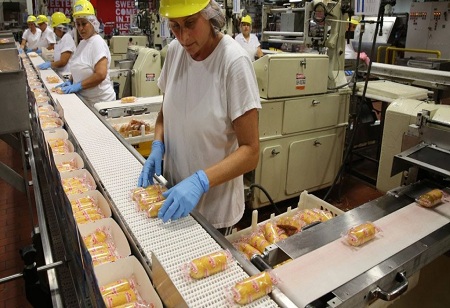“The secret of success in life is to eat what you like and let the food fight it out inside,” said Mark Twain. We have adapted ourselves to a lifestyle of using processed food products. The food processing industry has been on the rise during the Covid-19 time. The people were under the lockdown and had to buy stocks in advance for a few days each time. This created a demand for the food products, subsequently boosting the
Food processing Industry. Now, after the lockdown is over, the demand has changed in a unique way leading to traceability of the food products. The food products industry is rapidly becoming a leading Industry and is expected to reach a worth of $535 Bn by 2025.
After the pandemic, eating healthy and safe foods has become a trend. The demand for safely packaged food and healthy snacks has seen a rise. The consumers, in order to ensure that they are using healthy products have started demanding where the food products are received from. The traceability of the food products is expected by all in this current scenario.
"The food processing industry in India is a sunrise sector changing the trend from sustenance to market-oriented that has gained prominence in recent years," said PHDCCI advisor and former CMD of NSIC HP Kumar.
However, the market is fraught with several challenges that are hindering its growth. Let us look at some of the challenges today for the food processing Industry.
Availability of raw materials
In the food processing industry, availability of raw materials has been a major challenge for the companies. This challenge could be addressed by proper planning for the location of the plant as there are many uncertainties in the food Industry. The seasonal availability of raw products, the availability of local workforce and appropriate size of land are to be taken in account, the seasonal availability of the raw materials, the distance to the customers is also to be noted with regards to the type of the product. Other challenges are low farm productivity due to lack of mechanization, small and dispersed marketable surplus due to fragmented holdings and lack of proper supply chain result in lack of availability of raw materials. This, in turn, impedes food processing and its exports.
According to a report by Global Forest Watch there has been an increase in deforestation with India losing over 328 kha of humid primary forest from 2002 to 2019. This is also considered as a factor leading to the unavailability of raw materials. In order to make progress and ensure afforestation, many companies are going hand in hand with the government and NGOs.
Migration from rural to urban areas
India’s population of 121 crores is only second to China. The number of migrants from rural to urban areas stood at a whopping 450 million as per the 2011 Census. Since much of agriculture is predominantly done in rural areas, the problem of migration leads to unavailability of workforce in this field.
